- Home
- George R. R. Martin
Fevre Dream
Fevre Dream Read online
GEORGE R. R. MARTIN
BANTAM BOOKS
Table of Contents
Title Page
Dedication
Chapter 1
Chapter 2
Chapter 3
Chapter 4
Chapter 5
Chapter 6
Chapter 7
Chapter 8
Chapter 9
Chapter 10
Chapter 11
Chapter 12
Chapter 13
Chapter 14
Chapter 15
Chapter 16
Chapter 17
Chapter 18
Chapter 19
Chapter 20
Chapter 21
Chapter 22
Chapter 23
Chapter 24
Chapter 25
Chapter 26
Chapter 27
Chapter 28
Chapter 29
Chapter 30
Chapter 31
Chapter 32
Chapter 33
Chapter 34
Epilogue
About the Author
Also by George R. R. Martin
Praise for George R. R. Martin
Excerpt from Dying of the Light
Excerpt from The Armageddon Rag
Copyright Page
FOR HOWARD WALDROP,
a helluva writer, a helluva friend,
and a fevered dreamer if ever there was one.
CHAPTER ONE
St. Louis,
April 1857
Abner Marsh rapped the head of his hickory walking stick smartly on the hotel desk to get the clerk’s attention. “I’m here to see a man named York,” he said. “Josh York, I believe he calls hisself. You got such a man here?”
The clerk was an elderly man with spectacles. He jumped at the sound of the rap, then turned and spied Marsh and smiled. “Why, it’s Cap’n Marsh,” he said amiably. “Ain’t seen you for half a year, Cap’n. Heard about your misfortune, though. Terrible, just terrible. I been here since ’36 and I never seen no ice jam like that one.”
“Never you mind about that,” Abner Marsh said, annoyed. He had anticipated such comments. The Planters’ House was a popular hostelry among steamboatmen. Marsh himself had dined there regularly before that cruel winter. But since the ice jam he’d been staying away, and not only because of the prices. Much as he liked Planters’ House food, he was not eager for its brand of company: pilots and captains and mates, rivermen all, old friends and old rivals, and all of them knowing his misfortune. Abner Marsh wanted no man’s pity. “You just say where York’s room is,” he told the clerk peremptorily.
The clerk bobbed his head nervously. “Mister York won’t be in his room, Cap’n. You’ll find him in the dining room, taking his meal.”
“Now? At this hour?” Marsh glanced at the ornate hotel clock, then loosed the brass buttons of his coat and pulled out his own gold pocket watch. “Ten past midnight,” he said, incredulous. “You say he’s eatin’?”
“Yes sir, that he is. He chooses his own times, Mister York, and he’s not the sort you say no to, Cap’n.”
Abner Marsh made a rude noise deep in his throat, pocketed his watch, and turned away without a word, setting off across the richly appointed lobby with long, heavy strides. He was a big man, and not a patient one, and he was not accustomed to business meetings at midnight. He carried his walking stick with a flourish, as if he had never had a misfortune, and was still the man he had been.
The dining room was almost as grand and lavish as the main saloon on a big steamer, with cut-glass chandeliers and polished brass fixtures and tables covered with fine white linen and the best china and crystal. During normal hours, the tables would have been full of travelers and steamboatmen, but now the room was empty, most of the lights extinguished. Perhaps there was something to be said for midnight meetings after all, Marsh reflected; at least he would have to suffer no condolences. Near the kitchen door, two Negro waiters were talking softly. Marsh ignored them and walked to the far side of the room, where a well-dressed stranger was dining alone.
The man must have heard him approach, but he did not look up. He was busy spooning up mock turtle soup from a china bowl. The cut of his long black coat made it clear he was no riverman; an Easterner then, or maybe even a foreigner. He was big, Marsh saw, though not near so big as Marsh; seated, he gave the impression of height, but he had none of Marsh’s girth. At first Marsh thought him an old man, for his hair was white. Then, when he came closer, he saw that it was not white at all, but a very pale blond, and suddenly the stranger took on an almost boyish aspect. York was clean-shaven, not a mustache nor side whiskers on his long, cool face, and his skin was as fair as his hair. He had hands like a woman, Marsh thought as he stood over the table.
He tapped on the table with his stick. The cloth muffled the sound, made it a gentle summons. “You Josh York?” he said.
York looked up, and their eyes met.
Till the rest of his days were done, Abner Marsh remembered that moment, that first look into the eyes of Joshua York. Whatever thoughts he had had, whatever plans he had made, were sucked up in the maelstrom of York’s eyes. Boy and old man and dandy and foreigner, all those were gone in an instant, and there was only York, the man himself, the power of him, the dream, the intensity.
York’s eyes were gray, startlingly dark in such a pale face. His pupils were pinpoints, burning black, and they reached right into Marsh and weighed the soul inside him. The gray around them seemed alive, moving, like fog on the river on a dark night, when the banks vanish and the lights vanish and there is nothing in the world but your boat and the river and the fog. In those mists, Abner Marsh saw things; visions swift-glimpsed and then gone. There was a cool intelligence peering out of those mists. But there was a beast as well, dark and frightening, chained and angry, raging at the fog. Laughter and loneliness and cruel passion; York had all of that in his eyes.
But mostly there was force in those eyes, terrible force, a strength as relentless and merciless as the ice that had crushed Marsh’s dreams. Somewhere in that fog, Marsh could sense the ice moving, slow, so slow, and he could hear the awful splintering of his boats and all his hopes.
Abner Marsh had stared down many a man in his day, and he held his gaze for the longest time, his hand closed so hard around his stick that he feared he would snap it in two. But at last he looked away.
The man at the table pushed away his soup, gestured, and said, “Captain Marsh. I have been expecting you. Please join me.” His voice was mellow, educated, easy.
“Yes,” Marsh said, too softly. He pulled out the chair across from York and eased himself into it. Marsh was a massive man, six foot tall and three hundred pounds heavy. He had a red face and a full black beard that he wore to cover up a flat, pushed-in nose and a faceful of warts, but even the whiskers didn’t help much; they called him the ugliest man on the river, and he knew it. In his heavy blue captain’s coat with its double row of brass buttons, he was a fierce and imposing figure. But York’s eyes had drained him of his bluster. The man was a fanatic, Marsh decided. He had seen eyes like that before, in madmen and hell-raising preachers and once in the face of the man called John Brown, down in bleeding Kansas. Marsh wanted nothing to do with fanatics, with preachers, and abolitionists and temperance people.
But when York spoke, he did not sound like a fanatic. “My name is Joshua Anton York, Captain. J. A. York in business, Joshua to my friends. I hope that we shall be both business associates and friends, in time.” His tone was cordial and reasonable.
“We’ll see about that,” Marsh said, uncertain. The gray eyes across from him seemed aloof and vaguely amused now; whatever he had seen in them was gone. He felt confused.
/> “I trust you received my letter?”
“I got it right here,” Marsh said, pulling the folded envelope from the pocket of his coat. The offer had seemed an impossible stroke of fortune when it arrived, salvation for everything he feared lost. Now he was not so sure. “You want to go into the steamboat business, do you?” he said, leaning forward.
A waiter appeared. “Will you be dining with Mister York, Cap’n?”
“Please do,” York urged.
“I believe I will,” Marsh said. York might be able to outstare him, but there was no man on the river could outeat him. “I’ll have some of that soup, and a dozen oysters, and a couple of roast chickens with taters and stuff. Crisp ’em up good, mind you. And something to wash it all down with. What are you drinking, York?”
“Burgundy.”
“Fine, fetch me a bottle of the same.”
York looked amused. “You have a formidable appetite, Captain.”
“This is a for-mid-a-bul town,” Marsh said carefully, “and a formid-a-bul river, Mister York. Man’s got to keep his strength up. This ain’t New York, nor London neither.”
“I’m quite aware of that,” York said.
“Well, I hope so, if you’re going into steamboatin’. It’s the for-mid-a-bullest thing of all.”
“Shall we go directly to business, then? You own a packet line. I wish to buy a half-interest. Since you are here, I take it you are interested in my offer.”
“I’m considerable interested,” Marsh agreed, “and considerable puzzled, too. You look like a smart man. I reckon you checked me out before you wrote me this here letter.” He tapped it with his finger. “You ought to know that this last winter just about ruined me.
York said nothing, but something in his face bid Marsh continue.
“The Fevre River Packet Company, that’s me,” Marsh went on. “Called it that on account of where I was born, up on the Fevre near Galena, not ’cause I only worked that river, since I didn’t. I had six boats, working mostly the upper Mississippi trade, St. Louis to St. Paul, with some trips up the Fevre and the Illinois and the Missouri. I was doing just fine, adding a new boat or two most every year, thinking of moving into the Ohio trade, or maybe even New Orleans. But last July my Mary Clarke blew a boiler and burned, up near to Dubuque, burned right to the water line with a hundred dead. And this winter—this was a terrible winter. I had four of my boats wintering here at St. Louis. The Nicholas Perrot, the Dunleith, the Sweet Fevre, and my Elizabeth A., brand new, only four months in service and a sweet boat too, near 300 feet long with 12 big boilers, fast as any steamboat on the river. I was real proud of my lady Liz. She cost me $200,000, but she was worth every penny of it.” The soup arrived. Marsh tasted a spoonful and scowled. “Too hot,” he said. “Well, anyway, St. Louis is a good place to winter. Don’t freeze too bad down here, nor too long. This winter was different, though. Yes, sir. Ice jam. Damn river froze hard.” Marsh extended a huge red hand across the table, palm up, and slowly closed his fingers into a fist. “Put an egg in there and you get the idea, York. Ice can crush a steamboat easier than I can crush an egg. When it breaks up it’s even worse, big gorges sliding down the river, smashing up wharfs, levees, boats, most everything. Winter’s end, I’d lost my boats, all four of ’em. The ice took ’em away from me.”
“Insurance?” York asked.
Marsh set to his soup, sucking it up noisily. In between spoons, he shook his head. “I’m not a gambling man, Mister York. I never took no stock in insurance. It’s gambling, all it is, ’cept you’re bettin’ against yourself. What money I made, I put into my boats.”
York nodded. “I believe you still own one steamboat.”
“That I do,” Marsh said. He finished his soup and signaled for the next course. “The Eli Reynolds, a little 150-ton stern-wheeler. I been using her on the Illinois, ’cause she don’t draw much, and she wintered in Peoria, missed the worse of the ice. That’s my asset, sir, that’s what I got left. Trouble is, Mister York, the Eli Reynolds ain’t worth much. She only cost me $25,000 new, and that was back in ’50.”
“Seven years,” York said. “Not a very long time.”
Marsh shook his head. “Seven years is a powerful long time for a steamboat,” he said. “Most of ’em don’t last but four or five. River just eats ’em up. The Eli Reynolds was better built than most, but still, she ain’t got that long left.” Marsh started in on his oysters, scooping them up on the half shell and swallowing them whole, washing each one down with a healthy gulp of wine. “So I’m puzzled, Mister York,” he continued after a half-dozen oysters had disappeared. “You want to buy a half-share in my line, which ain’t got but one small, old boat. Your letter named a price. Too high a price. Maybe when I had six boats, then Fevre River Packets was worth that much. But not now.” He gulped down another oyster. “You won’t earn back your investment in ten years, not with the Reynolds. She can’t take enough freight, nor passengers neither.” Marsh wiped his lips on his napkin, and regarded the stranger across the table. The food had restored him, and now he felt like his own self again, in command of the situation. York’s eyes were intense, to be sure, but there was nothing there to fear.
“You need my money, Captain,” York said. “Why are you telling me this? Aren’t you afraid I will find another partner?”
“I don’t work that way,” Marsh said. “Been on the river thirty years, York. Rafted down to New Orleans when I was just a boy, and worked flatboats and keelboats both before steamers. I been a pilot and a mate and a striker, even a mud clerk. Been everything there is to be in this business, but one thing I never been, and that’s a sharper.”
“An honest man,” York said, with just enough of an edge in his voice so Marsh could not be sure if he was being mocked. “I am glad you saw fit to tell me the condition of your company, Captain. I knew it already, to be sure. My offer stands.”
“Why?” Marsh demanded gruffly. “Only a fool throws away money. You don’t look like no fool.”
The food arrived before York could answer. Marsh’s chickens were crisped up beautifully, just the way he liked them. He sawed off a leg and started in hungrily. York was served a thick cut of roasted beef, red and rare, swimming in blood and juice. Marsh watched him attack it, deftly, easily. His knife slid through the meat as if it were butter, never pausing to hack or saw, as Marsh so often did. He handled his fork like a gentleman, shifting hands when he set down his knife. Strength and grace; York had both in those long, pale hands of his, and Marsh admired that. He wondered that he had ever thought them a woman’s hands. They were white but strong, hard like the white of the keys of the grand piano in the main cabin of the Eclipse.
“Well?” Marsh prompted. “You ain’t answered my question.”
Joshua York paused for a moment. Finally he said, “You have been honest with me, Captain Marsh. I will not repay your honesty with lies, as I had intended. But I will not burden you with the truth, either. There are things I cannot tell you, things you would not care to know. Let me put my terms to you, under these conditions, and see if we can come to an agreement. If not, we shall part amiably.”
Marsh hacked the breast off his second chicken. “Go on,” he said. “I ain’t leaving.”
York put down his knife and fork and made a steeple of his fingers.
“For my own reasons, I want to be master of a steamboat. I want to travel the length of this great river, in comfort and privacy, not as passenger but as captain. I have a dream, a purpose. I seek friends and allies, and I have enemies, many enemies. The details are none of your concern. If you press me about them, I will tell you lies. Do not press me.” His eyes grew hard a moment, then softened as he smiled. “Your only interest need be my desire to own and command a steamboat, Captain. As you can tell, I am no riverman. I know nothing of steamboats, or the Mississippi, beyond what I have read in a few books and learned during the weeks I have spent in St. Louis. Obviously, I need an associate, someone who is familiar with the river an
d river people, someone who can manage the day-to-day operations of my boat, and leave me free to pursue my own purposes.
“This associate must have other qualities as well. He must be discreet, as I do not wish to have my behavior—which I admit to be sometimes peculiar—become the talk of the levee. He must be trustworthy, since I will give all management over into his hands. He must have courage. I do not want a weakling, or a superstitious man, or one who is overly religious. Are you a religious man, Captain?”
“No,” said Marsh. “Never cared for bible-thumpers, nor them for me.”
York smiled. “Pragmatic. I want a pragmatic man. I want a man who will concentrate on his own part of the business, and not ask too many questions of me. I value my privacy, and if sometimes my actions seem strange or arbitrary or capricious, I do not want them challenged. Do you understand my requirements?”
Marsh tugged thoughtfully on his beard. “And if I do?”
“We will become partners,” York said. “Let your lawyers and your clerks run your line. You will travel with me on the river. I will serve as captain. You can call yourself pilot, mate, co-captain, whatever you choose. The actual running of the boat I will leave to you. My orders will be infrequent, but when I do command, you will see to it that I am obeyed without question. I have friends who will travel with us, cabin passage, at no cost. I may see fit to give them positions on the boat, with such duties as I may deem fitting. You will not question these decisions. I may acquire other friends along the river, and bring them aboard as well. You will welcome them. If you can abide by such terms, Captain Marsh, we shall grow rich together and travel your river in ease and luxury.”
Abner Marsh laughed. “Well, maybe. But it ain’t my river, Mister York, and if you think we’re going to travel in luxury on the old Eli Reynolds, you’re going to be awful sore when you come on board. She’s a rackety old tub with some pretty poor accommodations, and most times she’s full of foreigners taking deck passage to one unlikely place or the other. I ain’t been on her in two years—old Cap’n Yoerger runs her for me now—but last time I rode her, she smelled pretty bad. You want luxury, you ought to see about buying into the Eclipse or the John Simonds.”

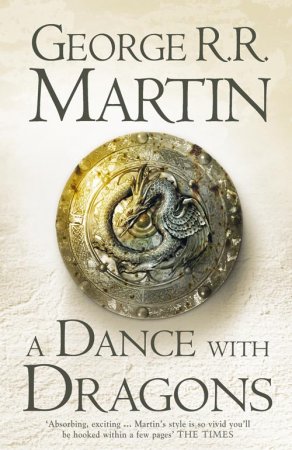 A Dance with Dragons
A Dance with Dragons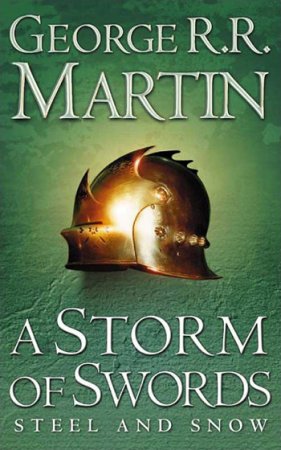 A Storm of Swords
A Storm of Swords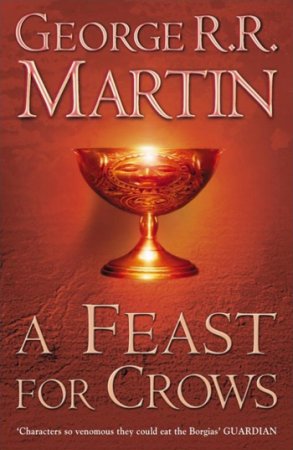 A Feast for Crows
A Feast for Crows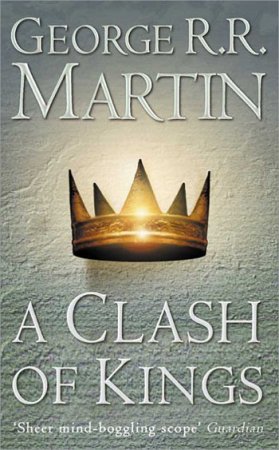 A Clash of Kings
A Clash of Kings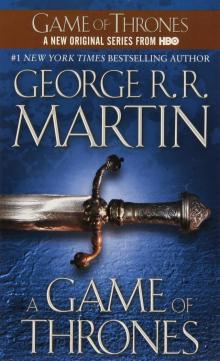 A Game of Thrones
A Game of Thrones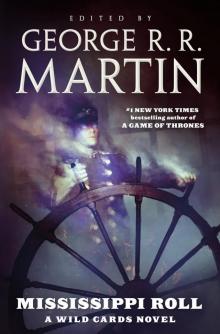 Mississippi Roll
Mississippi Roll Wild Cards V: Down and Dirty
Wild Cards V: Down and Dirty Busted Flush
Busted Flush When the Devil Drives
When the Devil Drives Dying of the Light
Dying of the Light The Ice Dragon
The Ice Dragon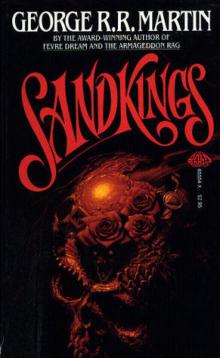 Sandkings
Sandkings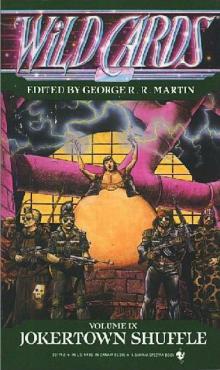 Jokertown Shuffle
Jokertown Shuffle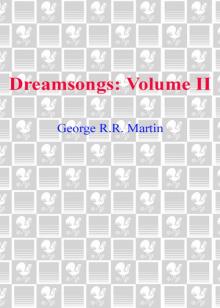 Dreamsongs. Volume II
Dreamsongs. Volume II Deuces Down
Deuces Down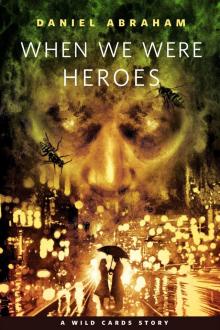 When We Were Heroes
When We Were Heroes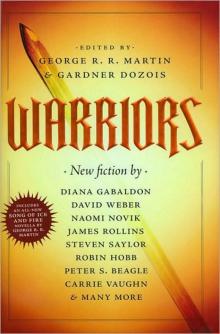 Warriors
Warriors In the House of the Worm
In the House of the Worm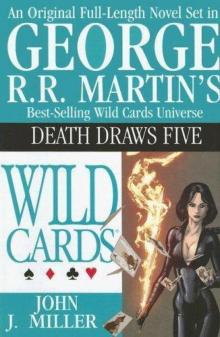 Death Draws Five
Death Draws Five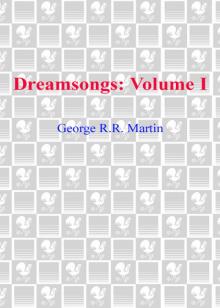 Dreamsongs. Volume I
Dreamsongs. Volume I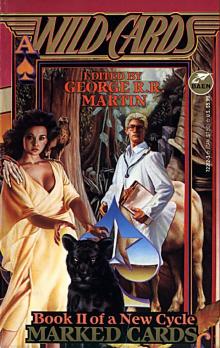 Marked Cards
Marked Cards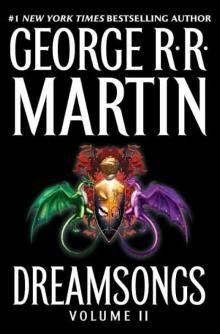 Dreamsongs
Dreamsongs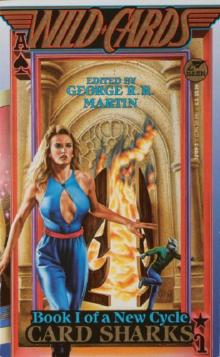 Card Sharks
Card Sharks Dangerous Women
Dangerous Women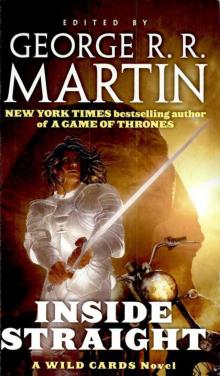 Inside Straight
Inside Straight Turn of the Cards
Turn of the Cards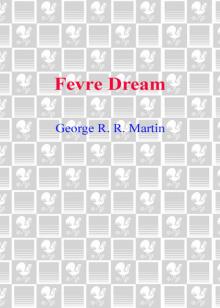 Fevre Dream
Fevre Dream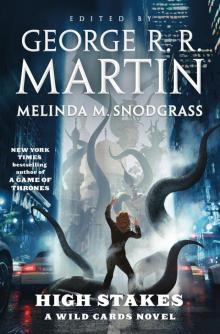 High Stakes: A Wild Cards Novel
High Stakes: A Wild Cards Novel Windhaven
Windhaven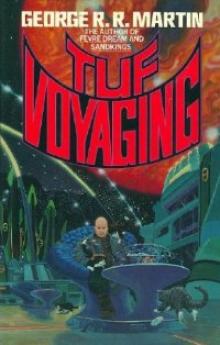 Tuf Voyaging
Tuf Voyaging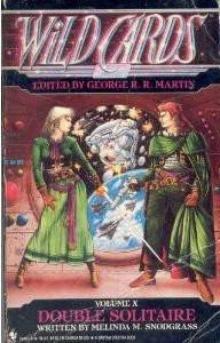 Double Solitaire
Double Solitaire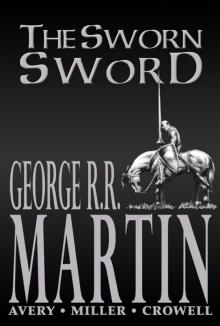 The Sworn Sword
The Sworn Sword Low Chicago
Low Chicago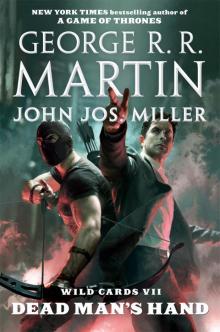 Dead Man's Hand
Dead Man's Hand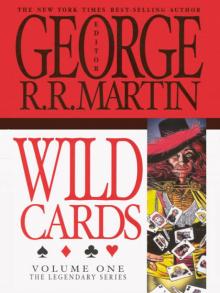 Wild Cards
Wild Cards Black Trump
Black Trump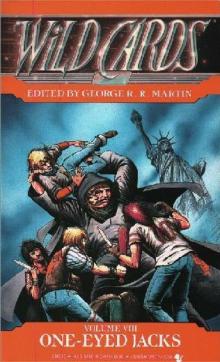 One Eyed Jacks
One Eyed Jacks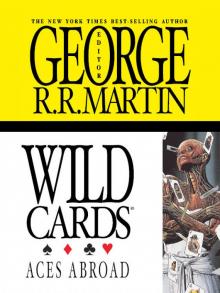 Wild Cards: Aces Abroad
Wild Cards: Aces Abroad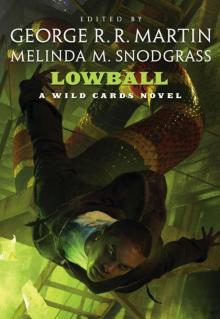 Lowball: A Wild Cards Novel
Lowball: A Wild Cards Novel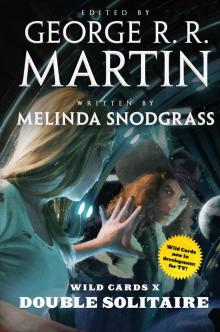 Double Solitaire (2019 Edition)
Double Solitaire (2019 Edition)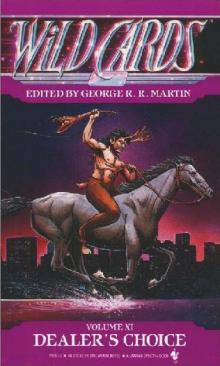 Dealer's Choice
Dealer's Choice Ace in the Hole
Ace in the Hole A Song for Lya: And Other Stories
A Song for Lya: And Other Stories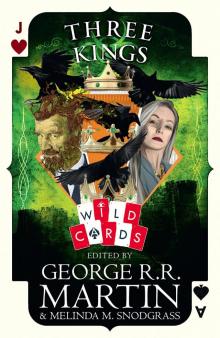 Three Kings
Three Kings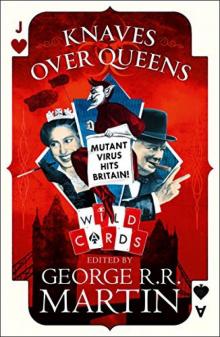 Knaves Over Queens
Knaves Over Queens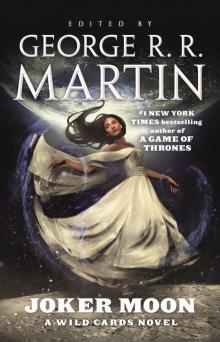 Joker Moon
Joker Moon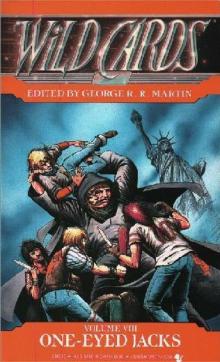 One Eyed Jacks wc-8
One Eyed Jacks wc-8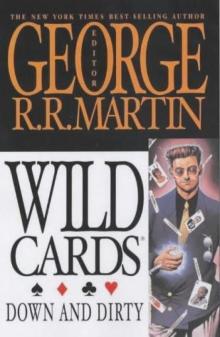 Down And Dirty wc-5
Down And Dirty wc-5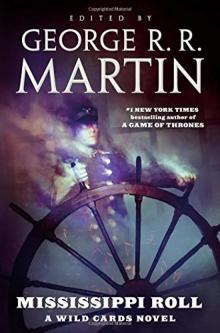 Mississippi Roll_A Wild Cards Novel
Mississippi Roll_A Wild Cards Novel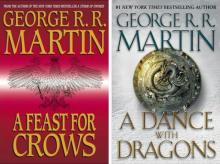 A Feast for Dragons
A Feast for Dragons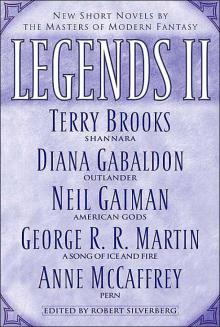 The Sworn Sword ttodae-2
The Sworn Sword ttodae-2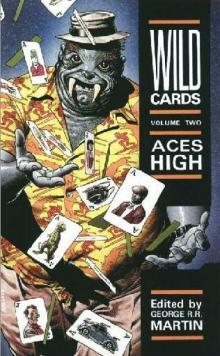 Aces High wc-2
Aces High wc-2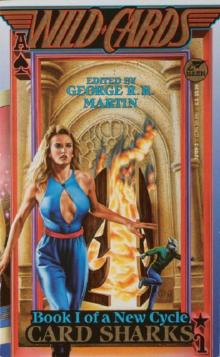 Wild Cards 13 : Card Sharks
Wild Cards 13 : Card Sharks Way of the Wizard
Way of the Wizard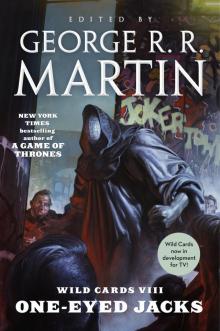 Wild Cards VIII: One-Eyed Jacks
Wild Cards VIII: One-Eyed Jacks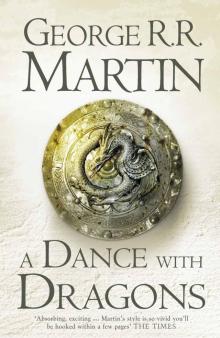 A Dance With Dragons: Book 5 of A Song of Ice and Fire (Song of Ice & Fire 5)
A Dance With Dragons: Book 5 of A Song of Ice and Fire (Song of Ice & Fire 5) The Princess and The Queen, Or, The Blacks and The Greens (a song of ice and fire)
The Princess and The Queen, Or, The Blacks and The Greens (a song of ice and fire)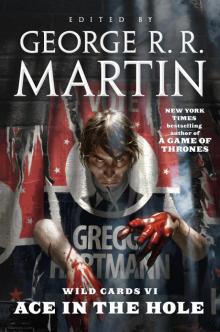 Wild Cards VI--Ace in the Hole
Wild Cards VI--Ace in the Hole The World of Ice & Fire: The Untold History of Westeros and the Game of Thrones (A Song of Ice and Fire)
The World of Ice & Fire: The Untold History of Westeros and the Game of Thrones (A Song of Ice and Fire)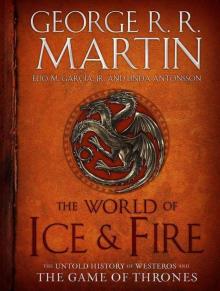 The World of Ice & Fire: The Untold History of Westeros and the Game of Thrones
The World of Ice & Fire: The Untold History of Westeros and the Game of Thrones Busted Flush wc-19
Busted Flush wc-19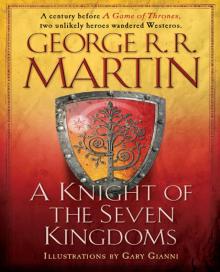 A Knight of the Seven Kingdoms
A Knight of the Seven Kingdoms Nightflyers: The Illustrated Edition
Nightflyers: The Illustrated Edition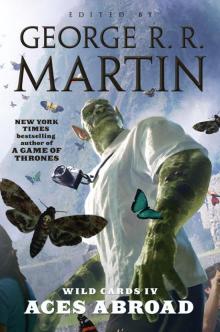 Wild Cards IV
Wild Cards IV Portraits of His Children
Portraits of His Children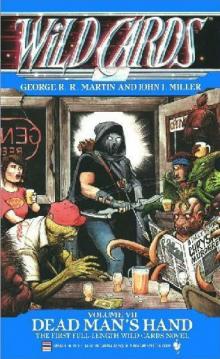 Dead Mans Hand wc-7
Dead Mans Hand wc-7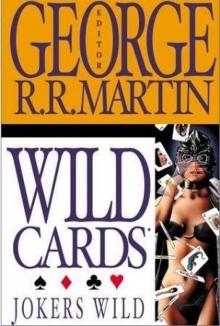 Jokers Wild wc-3
Jokers Wild wc-3 The Lonely Songs of Laren Dorr
The Lonely Songs of Laren Dorr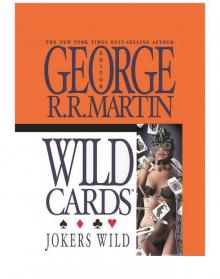 Wild Cards III: Jokers Wild
Wild Cards III: Jokers Wild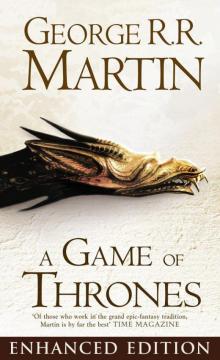 A Game of Thrones Enhanced Edition
A Game of Thrones Enhanced Edition Nightflyers & Other Stories
Nightflyers & Other Stories Armageddon Rag
Armageddon Rag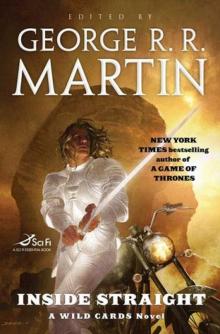 Wild Cards: Inside Straight
Wild Cards: Inside Straight A Song for Lya
A Song for Lya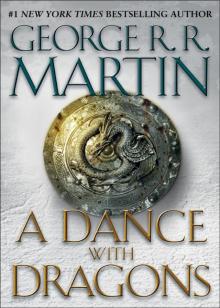 A Dance with Dragons: A Song of Ice and Fire: Book Five
A Dance with Dragons: A Song of Ice and Fire: Book Five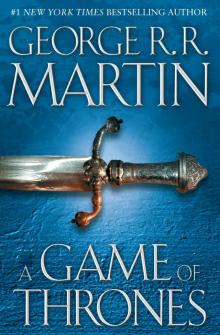 Song of Fire & Ice 01 - A Game of Thrones
Song of Fire & Ice 01 - A Game of Thrones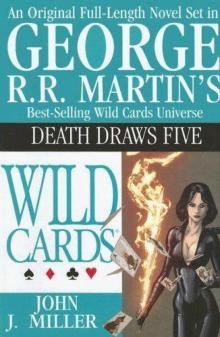 Death Draws Five wc-17
Death Draws Five wc-17 Turn of the Cards w-12
Turn of the Cards w-12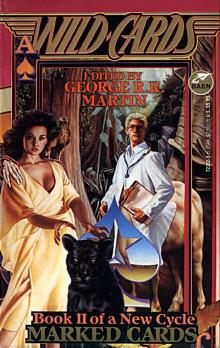 Wild Cards 14 - Marked Cards
Wild Cards 14 - Marked Cards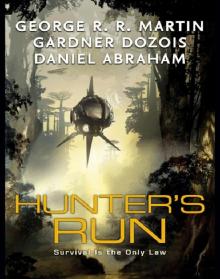 Hunter's Run
Hunter's Run The Glass Flower
The Glass Flower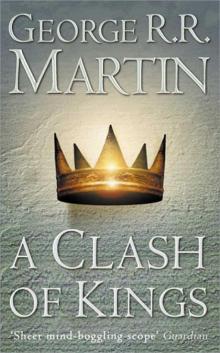 A Clash of Kings asoiaf-2
A Clash of Kings asoiaf-2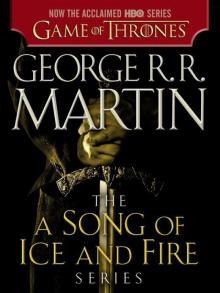 A Game of Thrones 5-Book Bundle: A Song of Ice and Fire Series: A Game of Thrones, A Clash of Kings, A Storm of Swords, A Feast for Crows, and A Dance with Dragons (Song of Ice & Fire)
A Game of Thrones 5-Book Bundle: A Song of Ice and Fire Series: A Game of Thrones, A Clash of Kings, A Storm of Swords, A Feast for Crows, and A Dance with Dragons (Song of Ice & Fire) Ace In The Hole wc-6
Ace In The Hole wc-6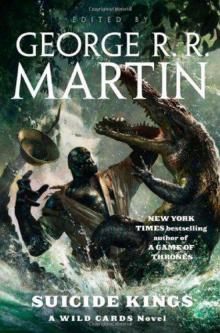 Suicide Kings wc-20
Suicide Kings wc-20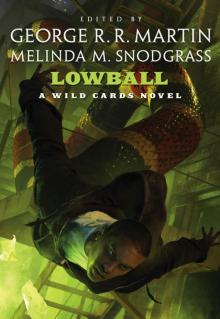 Lowball
Lowball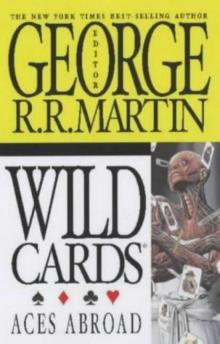 Aces Abroad wc-4
Aces Abroad wc-4 George R. R. Martin's a Game of Thrones 4-Book Bundle
George R. R. Martin's a Game of Thrones 4-Book Bundle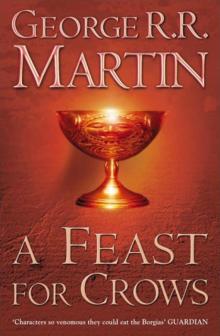 A Feast for Crows asoiaf-4
A Feast for Crows asoiaf-4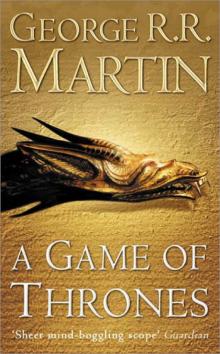 A Game of Thrones asoiaf-1
A Game of Thrones asoiaf-1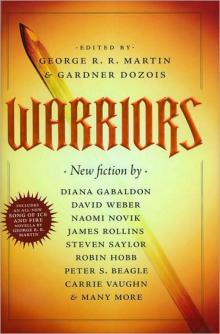 The Mystery Knight ttodae-3
The Mystery Knight ttodae-3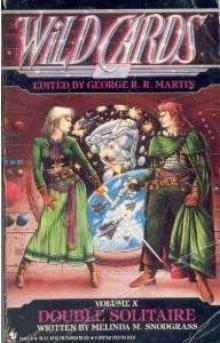 Double Solitaire w-10
Double Solitaire w-10 Wild Cards 15 - Black Trump
Wild Cards 15 - Black Trump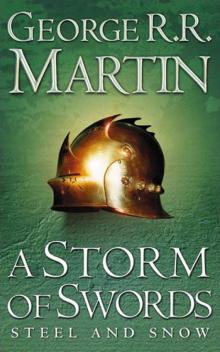 A Storm of Swords asoiaf-3
A Storm of Swords asoiaf-3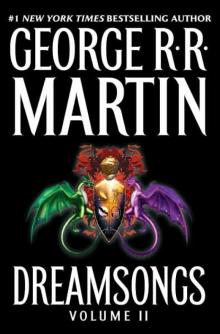 The Hedge Knight ttodae-1
The Hedge Knight ttodae-1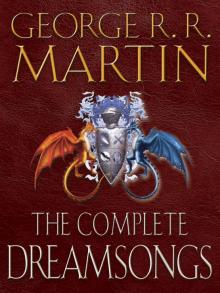 Dreamsongs 2-Book Bundle
Dreamsongs 2-Book Bundle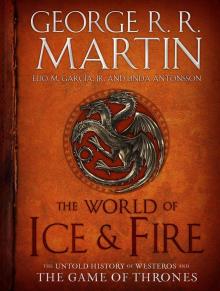 The World of Ice & Fire
The World of Ice & Fire Starlady & Fast-Friend
Starlady & Fast-Friend Old Mars
Old Mars Fantasy For Good: A Charitable Anthology
Fantasy For Good: A Charitable Anthology Wild Cards V
Wild Cards V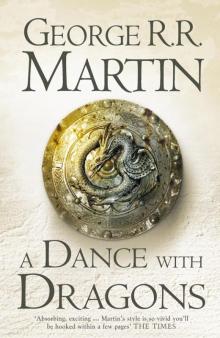 A Dance with Dragons asoiaf-5
A Dance with Dragons asoiaf-5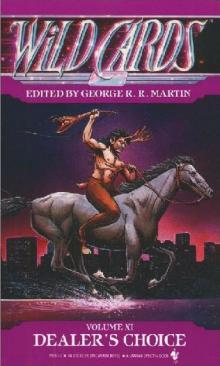 Dealer's Choice w-11
Dealer's Choice w-11 The Book of Magic
The Book of Magic A Game of Thrones 4-Book Bundle
A Game of Thrones 4-Book Bundle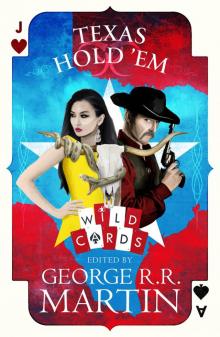 Texas Hold 'Em
Texas Hold 'Em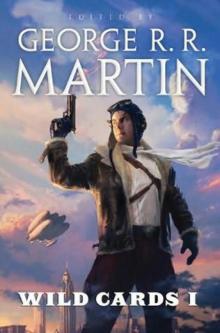 Wildcards wc-1
Wildcards wc-1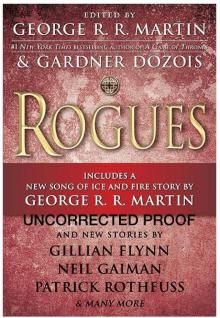 Rogues
Rogues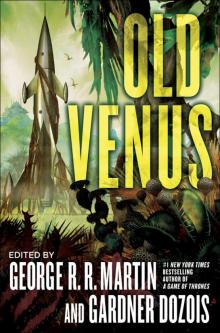 Old Venus
Old Venus